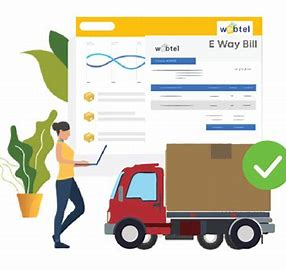Every manufacturer and service provider irrespective of their size, transports goods across India generating E-waybills every single minute of the day throughout the year. This is possible if both the organization and the transport company have robust IT systems and software solutions in place. This article explores what every organization must take into key consideration to ensure their E-waybill generation processes are as smooth as a newly laid highway.
Every manufacturer and service provider irrespective of their size transports goods across India, generating E-waybills every single minute of the day throughout the year. This is possible if both the organization and the transport company have robust IT systems and software solutions in place. This article explores what every organization must consider to ensure their E-waybill generation processes are as smooth as a newly laid highway.
Powerful Software
The efficiency of E-waybill generation pivots on the capacity, swift processing, and robust validation of the software.
The software’s algorithms need to check thoroughly, going through more than 100 tests to make sure the E-waybill generation is accurate and efficient. It’s important to connect the software with Enterprise Resource Planning (ERP) systems for smooth data flow. Businesses should look for software that easily fits with their current ERP systems, ensuring not just efficiency but also a two-way exchange of data between E-waybill generation and other business operations.

One must verify before zeroing down on the right software if the software can check for validations, surpass 100 checks, and integrate with any Enterprise Resource Planning (ERP) systems for a seamless data flow. Furthermore, the software should not only be efficient but also consider two-way data exchange between E-waybill generation and broader business operations.
Importantly, The software’s user interface must be easy on the eye, user friendly and intuitive.
Another game changer for E-waybill generation is the usage of Artificial Intelligence (AI). Businesses must opt for tools equipped with AI capabilities for matching sales invoices with E-way Bills while keeping in mind data protection, safety is also addressed.
Additionally, compliance with relevant regulations and standards ensures a secure environment for E-waybill operations, mitigating potential risks.
Also Read: Role of Technology in E-waybill Validity Management
Quick to Adapt
Regulatory authorities as a policy introduce updates to enhance the efficiency and transparency of the transportation process. Adapting to these changes is essential to ensure seamless operations, avoid disruptions in their supply chain processes, and remain compliant.
Geographical considerations play a pivotal role in E-waybill compliance, particularly for businesses operating across different states. Each state may have its own set of rules, and understanding these rules is critical. For example, some states like Tamil Nadu have a different threshold value for E-waybill generation based on the value of transported goods while J&K has no requirement of a transporter needing an E-waybill. Also, factors such as threshold values for E-waybill generation and exemptions based on transportation distance within a state can significantly differ.
E-waybill compliance comes with exemptions and special cases that businesses need to be aware of to prevent avoidable violations. These exemptions may include goods transported for short distances within a state or union territory. Understanding these exemptions and special cases is imperative to ensure accurate and compliant E-waybill generation.
Also Read: Threshold Limits for E-waybill Exemptions: State-wise Variations
New Kid on the Block
Blockchain integration, AI-driven compliance solutions, enhanced connectivity through Internet of Things (IoT), and the proposed unified national E-waybill system could change the very landscape of E-waybills generation and compliance.
For instance, Blockchain technology can revolutionize E-waybill compliance by providing a secure and transparent system for recording transactions, bringing trust to the system, and eliminating the risk of data tampering, ensuring the integrity of E-waybill records.
Deploying Internet of Things (IoT) will result in better connectivity between vehicles, goods, and regulatory systems. This seamless connectivity can streamline the E-waybill generation process, improve overall efficiency, and provide real-time insights into the movement of goods.
Lastly, the proposed Unified National E-waybill system, in turn, could simplify compliance for businesses operating in multiple states. Standardizing E-waybill rules and procedures across the country can reduce compliance issues and management.
Summing up, businesses for the near future must invest in the best software to ensure state-specific E-waybill compliances are being met while making sure the approach combines regulatory awareness, technological integration, and proactive strategies.
Also Read: Timely Invoice Generation And Verification: Crucial For E-Waybill Compliance
Frequently Asked Questions
-
Why is powerful software crucial for E-waybill generation?
The efficiency of E-waybill generation relies on robust software with swift processing and thorough validation.
-
How many tests should the software go through for accurate E-waybill generation?
The software should undergo more than 100 tests to ensure accuracy.
-
Why is integrating software with Enterprise Resource Planning (ERP) systems important?
Integration ensures a smooth data flow between E-waybill generation and other business operations.
-
What role does Artificial Intelligence (AI) play in E-waybill generation?
AI assists in matching sales invoices with E-way Bills while addressing data protection and safety.
-
Why is compliance with regulations and standards crucial for E-waybill operations?
Compliance ensures a secure environment, mitigating potential risks in E-waybill generation.
-
How important is adaptability to regulatory changes for E-waybill processes?
Adapting to changes is essential for seamless operations and compliance in E-waybill processes.
-
Why do geographical considerations matter in E-waybill compliance?
Different states may have varied rules, thresholds, and exemptions for E-waybill generation.
-
What are some exemptions and special cases in E-waybill compliance?
Exemptions may include goods transported for short distances within a state, requiring awareness for accurate E-waybill generation.
-
How can Blockchain technology revolutionize E-waybill compliance?
Blockchain ensures a secure and transparent system, eliminating data tampering risks in E-waybill records.
-
What potential changes in E-waybill generation are mentioned for the near future?
Blockchain integration, AI-driven compliance solutions, IoT connectivity, and a proposed Unified National E-waybill system are highlighted as potential game-changers.

